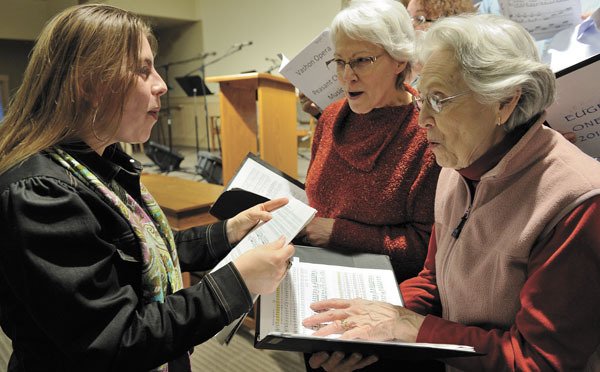Maria Marcy carefully balances a brimming cup of chai on a tipsy round table at Minglement. “Did you know chai in Russian means ‘black tea’?” she says.
No, I did not. To be honest, I know next to nothing about the Russian language. Which could be a major problem since I’ve signed up to sing in the chorus of Vashon Opera’s mid-May production of one of Russia’s best-known operas, Tchaikovsky’s “Eugene Onegin.” To sing, that is, in Russian.
It seems like a daunting task for a non-Slavophile. Fortunately, the enthusiastic and endlessly patient Maria Marcy, is on call. A native Russian speaker and Vashon resident for the past 15 years, Maria has, in addition to singing in the 21-member chorus, agreed to act as Russian tutor for the entire opera cast.
The need for a language coach is obvious from the first choral rehearsal. For starters, the words in Tchaikovsky’s score are written in Cyrillic, the 33-letter Russian alphabet. “Letters that look like English letters sound completely different,” Maria notes. “Also, there are Russian sounds that Americans aren’t used to.” To prove the point, she grits her teeth together and makes a nasal wheeze.
“On top of this, Tchaikovsky (she pronounces the composer’s name with the proper Russian flair: chay-KOFF-ski) used 18th century Old Slavonic folk music for the chorus. Some of the words are no longer even used in everyday Russian,” she adds, cheerfully.
While the choral part of “Eugene Onegin” is blessedly brief relative to the whole opera, a portion of it is sung lickety-split. A CD with Maria carefully enunciating every syllable was handed to every chorus member to help with memorization.
“Skoree noh zhenkee, zappa ho dushkee” she intones on the disc in slow, flawless Russian. “Bay lee roo zhenkee, sara po dushkee.”
A few rehearsals later, Maria is encouraged. “I know it’s hard, but I was impressed when we put the words and music together. It sounds really good.”
That’s personally important to Maria because the story of Eugene Onegin, from a work by Russia’s greatest poet, Aleksandr Pushkin, is known and beloved by nearly every Russian.
“It’s a story of all the timeless things in our lives — marriage, temptations, loyalty and friendship,” she says.
“I had to learn Pushkin by heart in high school,” she adds. “I had a wonderful literature teacher who made me memorize Tatiana’s entire letter scene.” In the opera, the famous “Letter Aria” runs more than 10 minutes, uninterrupted. It’s a tour de force for any soprano and is sung in Vashon Opera’s production by the company’s artistic director, Jennifer Krikawa.
Maria was raised 1,000 miles east of Moscow in the gritty industrial city of Nizhniy Tagil in the Ural Mountains. Her parents were originally from Siberia — her father an electrician and her mother a microbiologist.
She won a highly competitive admission to the foreign language department of the local university where she studied English and French. During her fourth year, one of her professors invited a visiting American employee of the U.S. Environmental Protection Agency, who was working on a local air and water quality cleanup project, to address her class. It was Vashon Islander Ken Marcy.
“There were 14 girls in the class, but he asked me for a date,” Maria recalls, smiling. “He was there for nine months. At the end, he invited me to Vashon. He was renting a cabin off Pohl Road on the south end with a gorgeous view of Mount Rainier and the Tahlequah ferry. He proposed and I said, ‘yes.’”
That was 1997. The couple now has a 10-year-old son, Dmitry. Thankfully for her language-challenged American friends, Maria took her husband’s last name, Marcy, leaving her full maiden name — Maria Anatolyevna Bezhentseva — to family history.
These days, Maria maintains her Old Country ties by representing several Russian artists from the Ural Mountain region through her company, Shambala Studio. Islanders can see a sample of this work in a collection of contemporary icons on display at Kronos in downtown Vashon.
Some of her imported art will find its way into the opera set, designed to create the ambiance of Pushkin’s era. “It’s going to be like being in Russia in the late 1800s. We’re going to have a fabulous Russian show.”
And there’s family pride: Husband Ken and son Dmitry will also be on stage in the production.
Sipping the last of her Minglemint chai, she adds: “I started working in Russia as an English tutor for Russian students. Now I’m a Russian tutor for Vashon Opera. You never know what surprises life will bring.”
— Gene Carlson is a writer and a member of the Vashon Opera.


